

The one weapon that strikes more terror into the enemies of the Church is the Bulla of Pope Pius II, Execrabilis, on 18 January 1460 condemning conciliarism.
The bull received its name from the opening word of its Latin text, which labeled as “execrable” all efforts to appeal an authoritative ruling of a Pope to a council.
This bull denounces those who presume to appeal from the pope to a future council, in spite of the fact that the pope is the vicar of Jesus Christ and condemn[s] all such appeals and prohibit[s] them as erroneous and detestable. Penalties for violators of any status or rank, including those having imperial, royal or even papal dignity, are grave. Anyone who contravened this papal decree would “ipso facto incur sentence of anathema, from which he cannot be absolved except by the Roman Pontiff and at the point of death. The bull concludes with a formula also used by Pope Pius XII at the conclusion of his Munificentissimus Deus that if anyone would seek to alter this decree, “let him know that he shall incur the indignation of Almighty God and of Saints Peter and Paul, His apostles.” Find more information about “Execrabilis” historical background.
|
EXECRABILIS |
| PIUS EPISCOPUS, Servus Servorum Dei, ad futuram rei memoriam. | Pius the Bishop, servant of the servants of God, for a perpetual memorial of the matter. |
| 1. Execrabilis, et pristinis temporibus inauditus tempestate nostra inolevit abusus, ut a Romano Pontifice, Jesu Christi Vicario, cui dictum est in persona Beati Petri: “Pasce oves meas,” et “quodque ligaveris super terram, erit ligatum et in Caelis,” nonnulli spiritu rebellionis imbuti, non sanioris cupiditate judicii, sed commissi evasione peccati, ad futurum Concilium provocare praesumant, quod quantum sacris Canonibus adversetur, quantumque Reipublicae Christianae noxium sit, quisquis non ignarus jurium intelligere potest. Namque (ut alia praetereamus, quae huic corruptelae manifestissime refragantur) quis non illud ridiculum judicaverit, quod ad id appellatur quod nusquam est, neque scitur quando futurum sit? Pauperes a potentioribus multipliciter opprimuntur, remanent impunita scelera, nutritur adversus primam Sedem rebellio, libertas delinquendi conceditur, et omnis Ecclesiastica disciplina, et hierarchicus ordo confunditur. | 1. An execrable, and in former ages unheard-of abuse, has sprung up in our time, namely that many people, imbued with the spirit of rebellion, presume to appeal to a future Council from the Roman Pontiff, the Vicar of Jesus Christ, to whom it was said in the person of blessed Peter: “Feed my sheep” and “Whatsoever thou shalt bind on earth shall be bound also in Heaven”; they do not do so because they are anxious to obtain sounder judgment, but in order to escape the consequences of their sins, and anyone who is not ignorant of the laws can realize how contrary this is to the sacred canons and how detrimental to the Christian community. Because–passing over other things which are most manifestly opposed to this corruption–who would not find it ridiculous when appeals are made to what does not exist and the time of whose future existence nobody knows? The poor are oppressed in many ways by the stronger, crimes remain unpunished, freedom is conceded to delinquents, and all the ecclesiastical discipline and hierarchical order is confounded. |
| 2. Volentes igitur hoc pestiferum virus a Christi Ecclesia procul pellere, et ovium nobis commissarum saluti consulere, omnemque materiam scandali, ab ovili nostri Salvatoris arcere, de venerabilium Fratrum nostrorum Sanctae Romanae Ecclesiae Cardinalium, cunctorumque praelatorum, ac Divini humanique juris interpretum, curiam sequentium, consilio, et assensu, ac certa nostra scientia, hujusmodi provocationes damnamus, et tamquam erroneas ac detestabiles reprobamus, cassantes, et penitus annullantes, si quae hactenus taliter interpositae reperiantur, easque tamquam inanes, ac pestiferas, nullius momenti esse decernimus, et declaramus. Precipientes deinceps, ut nemo audeat quovis quaesito colore, ab ordinationibus, sententiis, sive mandatis quibuscumque nostris, ac successorum nostrorum, talem appellationem interponere, aut interpositae per alium adhaerere, seu eis quomodolibet uti. | 2. Wishing therefore to thrust away from Christ’s Church this pestilent venom, to take care of the salvation of all those who have been committed to us, and to hold off from the sheepfold of our Saviour all cause of scandal, we condemn appeals of this kind by the counsel of all prelates and jurisconsults of Divine and human law adhering to the Curia and on the ground of our sure knowledge; and we denounce them as erroneous and detestable, quash and entirely annul them in the event that any such appeals, extant at present, may be discovered, and we declare and determine that they are–like something void and pestilent–of no significance. Consequently, we enjoin that nobody dares under whatever pretext to make such an appeal from any of our ordinances, sentences or commands and from those of our successors, or to adhere to such appeals, made by others, or to use them in any manner. |
| 3. Si quis autem contrafecerit, a die publicationis praesentium, in Cancellaria Apostolica, post duos menses, cujuscumque status, gradus, ordinis, vel conditionis fuerit, etiam si Imperiali, Regali, vel Pontificali praefulgeat dignitate, ipso facto sententiam execrationis incurrat, a qua nisi per Romanum Pontificem, et in mortis articulo, absolvi non possit. Universitas vero sive Collegium, Ecclesiastico subjaceat interdicto, et nihilominus tam Collegia, et Universitates, quam praedictae, et aliae quaecumque personae, eas poenas ac censuras incurrant, quas rei Majestatis, et haereticae pravitatis fautores, incurrere dignoscuntur. Tabelliones insuper, ac testes, qui hujusmodi actibus interfuerint, et generaliter qui scienter consilium, auxilium dederint, vel favorem talibus appellantibus, pari poena plectantur. | 3. If any one, of whatever status, rank, order or condition he may be, even if adorned with Imperial, royal or Papal dignity, shall contravene this after the space of two months from the day of the publication of this Bull by the Apostolic Chancery, he shall “ipso facto” incur sentence of anathema, from which he can not be absolved except by the Roman Pontiff and at the point of death. A University or a corporation shall be subjected to an ecclesiastical interdict; nonetheless, corporations and Universities, like the aforesaid and any other persons, shall incur those penalties and censures which offenders who have committed the “crimen laesae maiestatis” and promoters of heretical depravity are known to incur. Furthermore scriveners and witnesses who shall witness acts of this kind and, in general, all those who shall knowingly furnish counsel, help or favour to such appealers, shall be punished with the same penalty. |
| Nulli ergo hominum liceat hanc paginam nostrorum voluntatis, damnationis, reprobationis, cassationis, annullationis, decreti, declarationis, et mandati infringere, vel ei ausu temerario contraire. Si quis autem hoc attentare praesumpserit, indignationem omnipotentis Dei, ac Beatorum Petri, et Pauli Apostolorum ejus, se noverit incursurum. | Therefore, it is not allowed to any man to infringe or to oppose by audacious perversion this charter of our will, by which we have condemned, reproved, quashed, annulled, decreed, declared and ordered the aforesaid. If any one, however, shall so attempt, let him know that he shall incur the indignation of Almighty God and of Saint Peter and Paul, His Apostles. |
| Datum Mantuae Anno Incarnationis Dominicae, millesimo quadringentesimo quinquagesimo nono decimo quinto Kalendas Februarii, Pontificatus nostri Anno Secundo. | Given at Mantua, in the year 1460 of the Lord’s Incarnation, on the fifteenth day before the Kalends of February, in the second year of our Pontificate. |
| PIUS II |
Has Vatican Council II voided “Execrabilis” by Pope Pius II ?

-
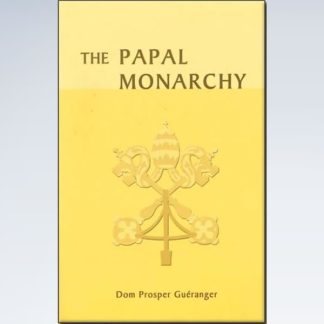 The Papal Monarchy by Dom Prosper GuérangerUS$ 22.00
The Papal Monarchy by Dom Prosper GuérangerUS$ 22.00 -
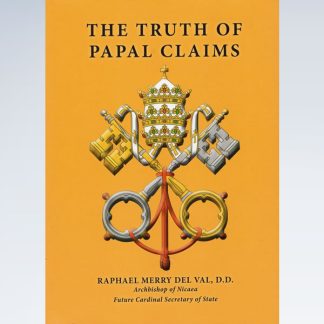 The Truth of Papal ClaimsUS$ 22.00
The Truth of Papal ClaimsUS$ 22.00 -
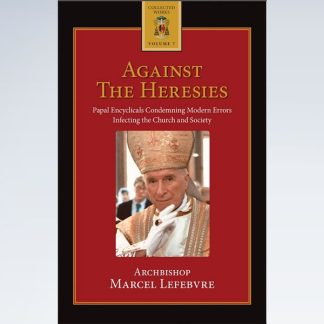 Against the Heresies by Archbishop LefebvreUS$ 25.00
Against the Heresies by Archbishop LefebvreUS$ 25.00 -
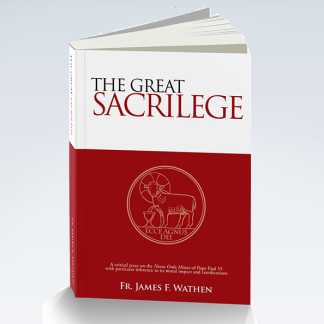 The Great SacrilegeUS$ 25.00
The Great SacrilegeUS$ 25.00 -
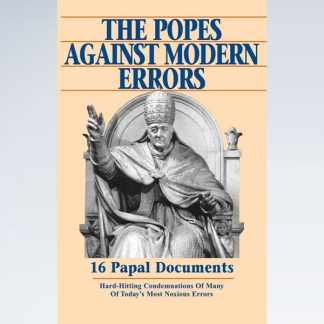 The Popes Against Modern Errors: 16 Papal DocumentsUS$ 24.00
The Popes Against Modern Errors: 16 Papal DocumentsUS$ 24.00 -
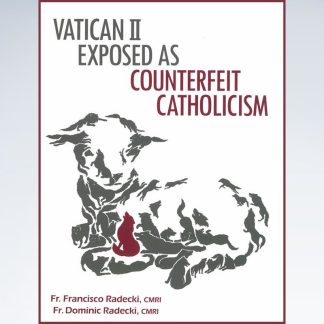 Vatican II Exposed as Counterfeit CatholicismUS$ 65.00
Vatican II Exposed as Counterfeit CatholicismUS$ 65.00
VIRGÓ SACRÁTA is a Christian mission-driven online resource and shop inspired from the beauty of Catholic faith, tradition, and arts. Our mission is to “Restore All Things to Christ!”, in continuing the legacy of Pope St. Pius X under the patronage of the Blessed Virgin Mary. “Who is she that cometh forth as the morning rising, fair as the moon, bright as the sun, terrible as an army set in battle array?” O Mary, conceived without sin, pray for us who have recourse to Thee.


